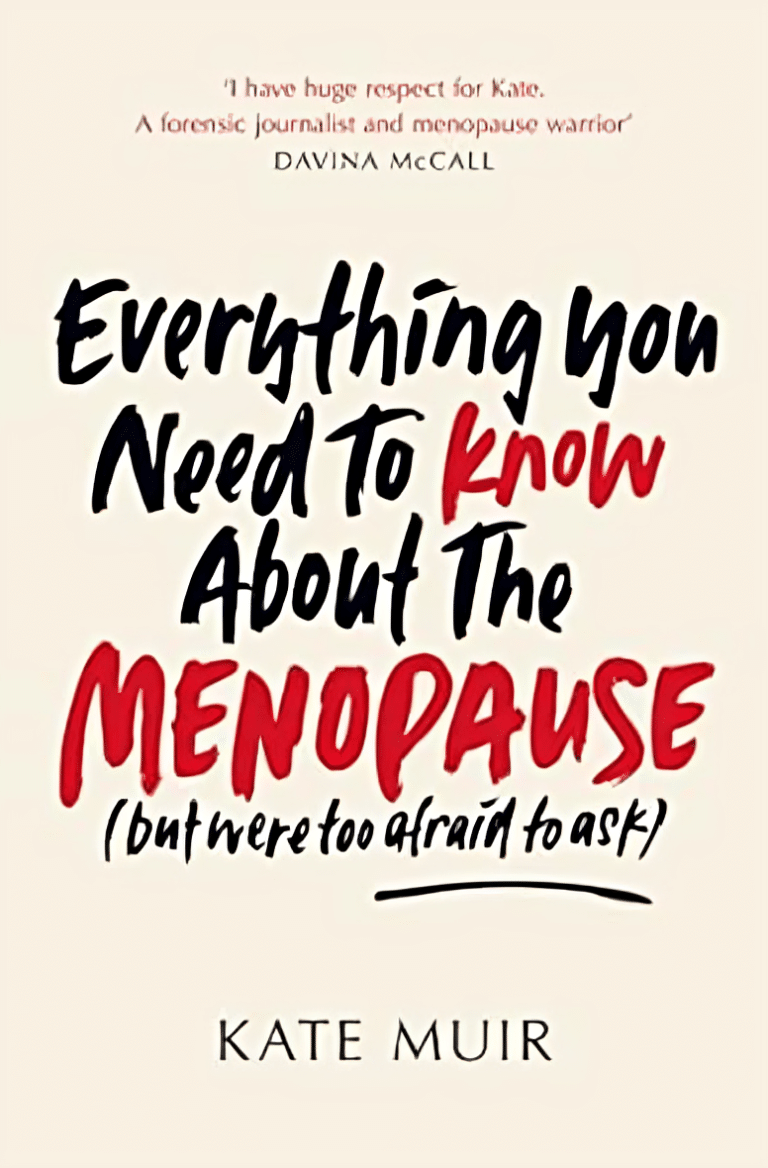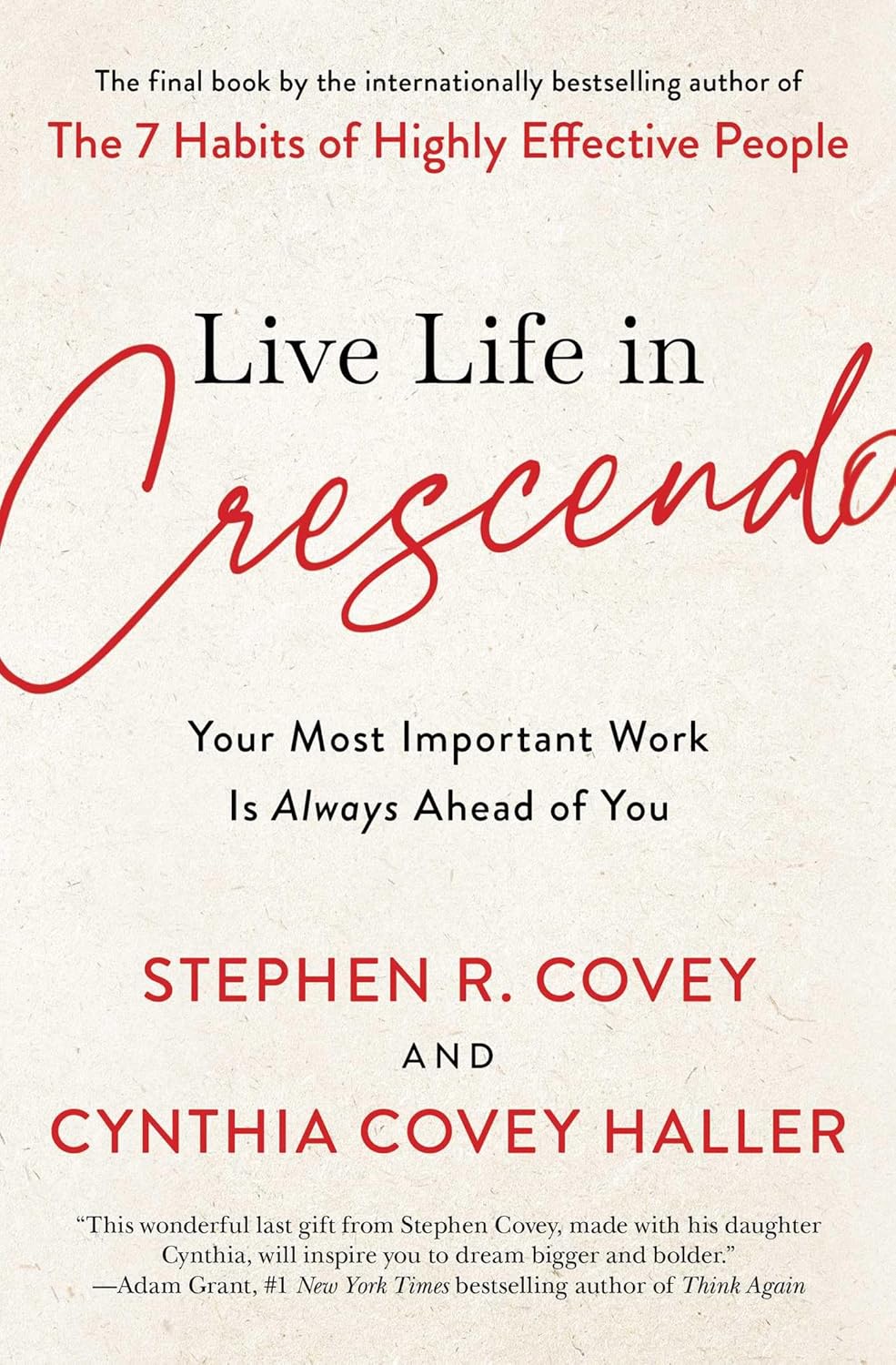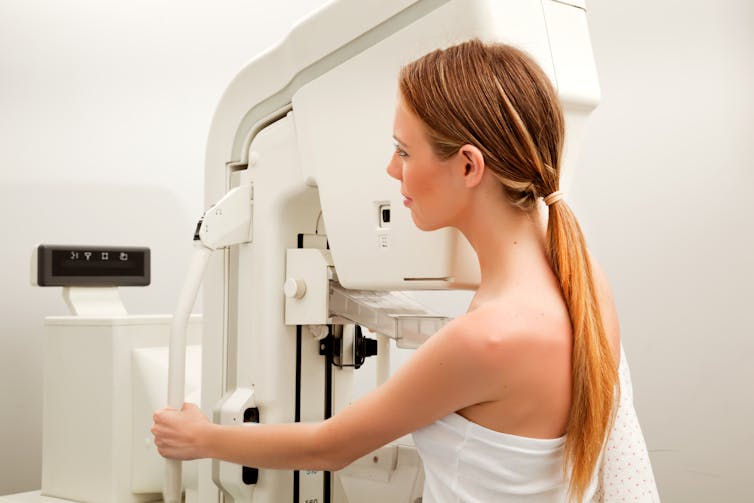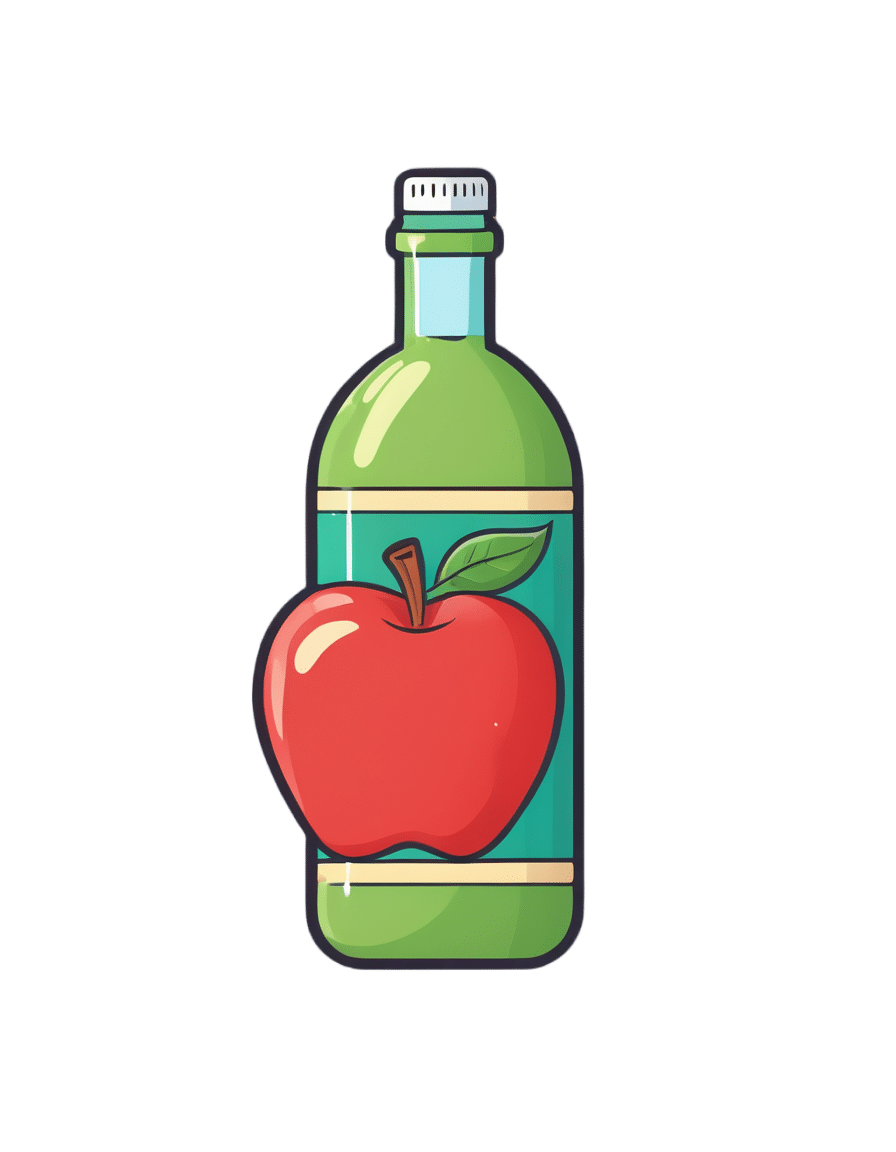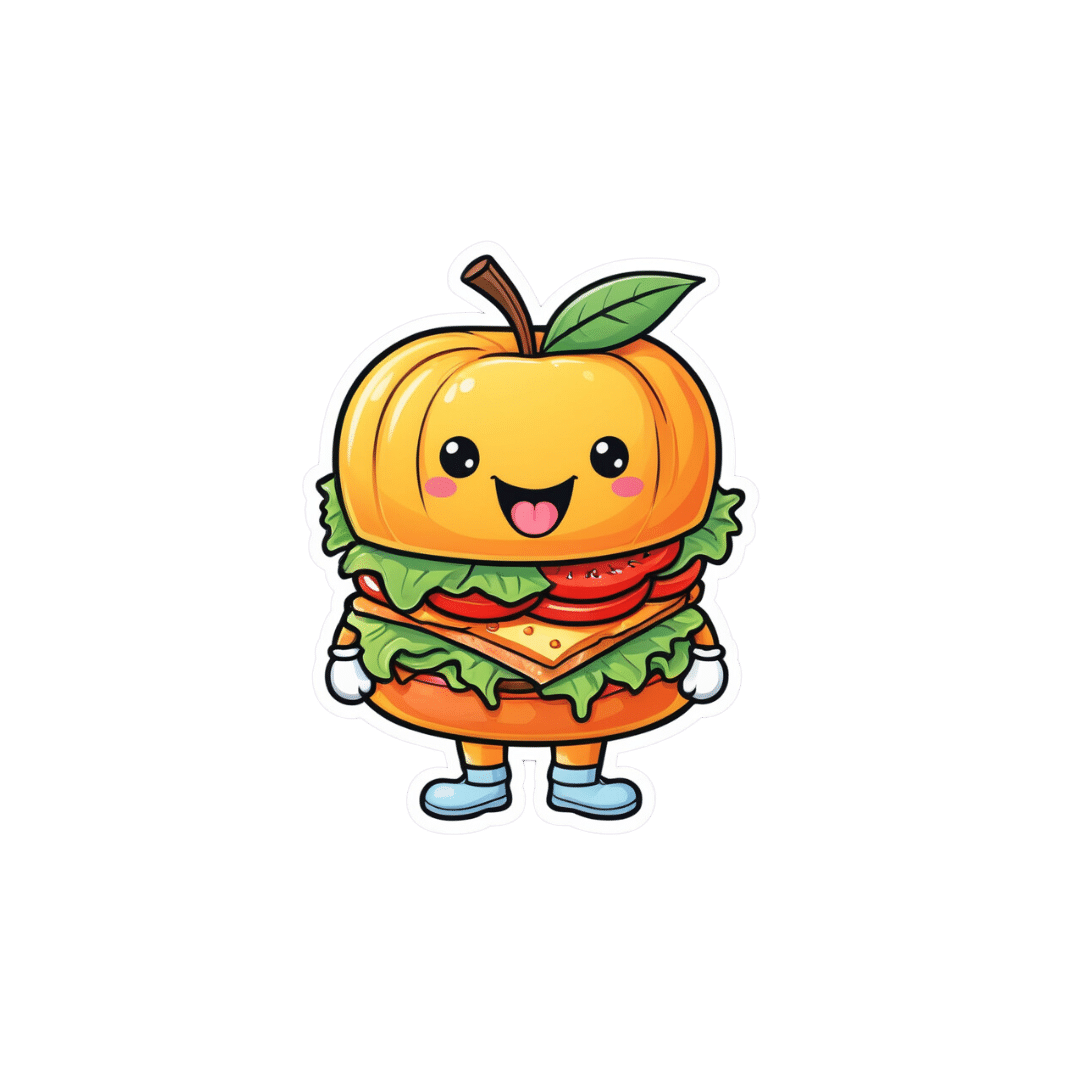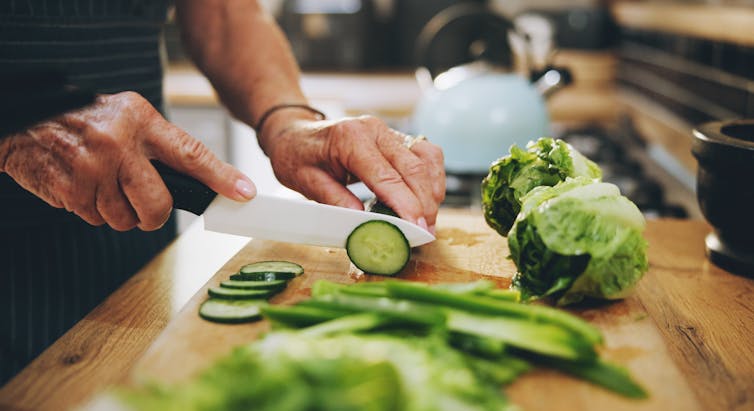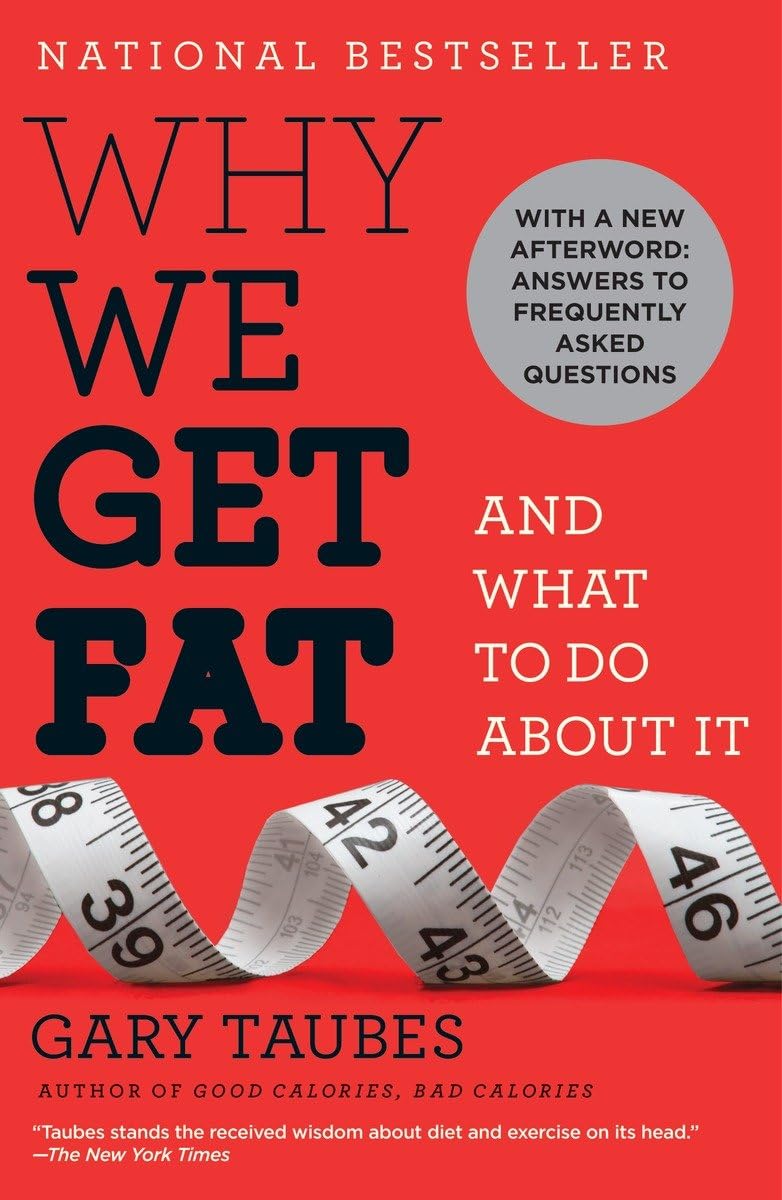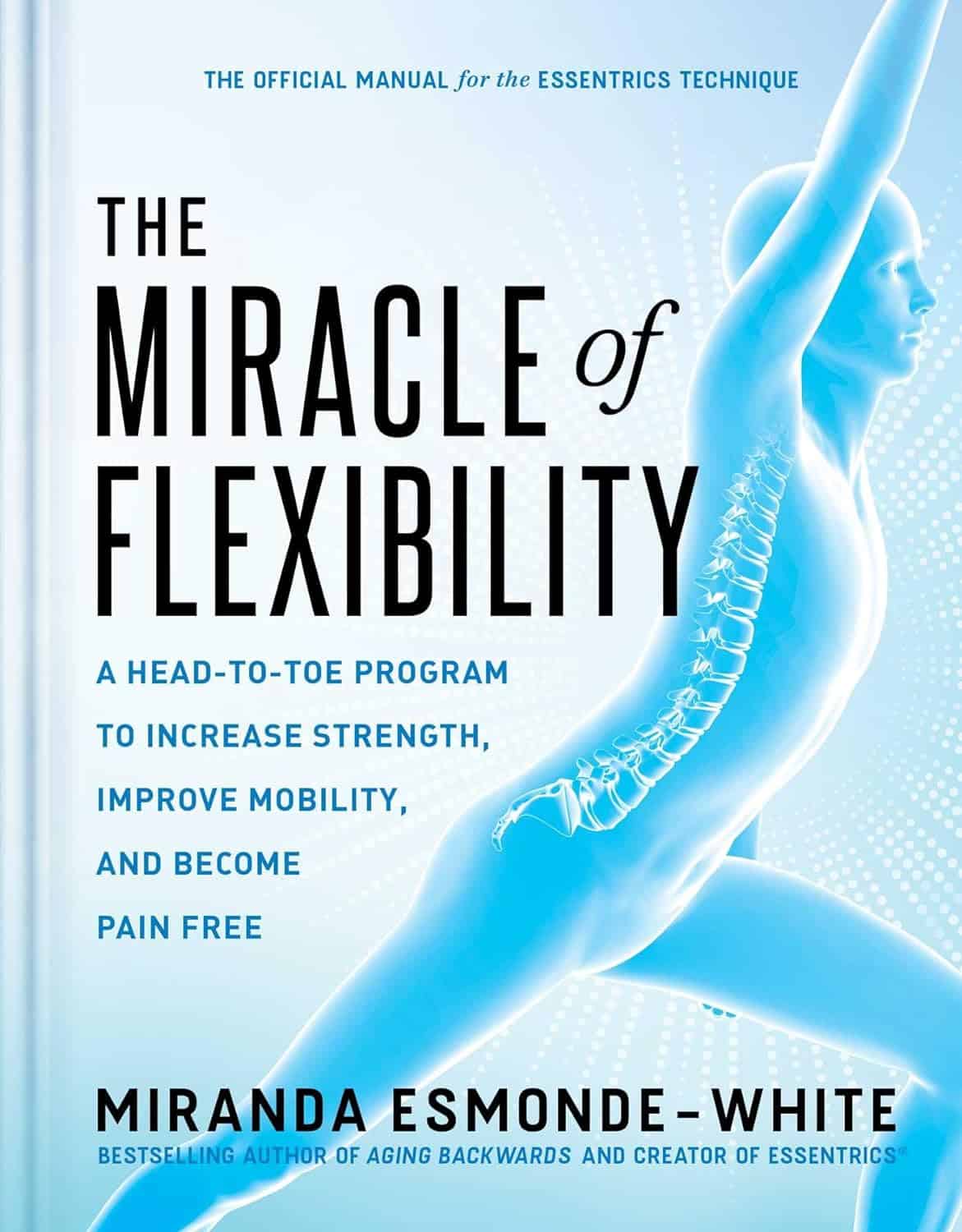
The Miracle of Flexibility – by Miranda Esmonde-White
10almonds is reader-supported. We may, at no cost to you, receive a portion of sales if you purchase a product through a link in this article.
We’ve reviewed books about stretching before, so what makes this one different?
Mostly, it’s that this one takes a holistic approach, making the argument for looking after all parts of flexibility (even parts that might seem useless) because if one bit of us isn’t flexible, the others will start to suffer in compensation because of how that affects our posture, or movement, or in many cases our lack of movement.
Esmonde-White’s “flexibility, from your toes to your shoulders” approach is very consistent with her background as a professional ballet dancer, and now she brings it into her profession as a coach.
The book’s not just about stretching, though. It looks at problems and what can go wrong with posture and the body’s “musculoskeletal trifecta”, and also shares daily training routines that are tailored for specific sporting interests, and/or for those with specific chronic conditions and/or chronic pain. Working around what needs to be worked around, but also looking at strengthening what can be strengthened and fixing what can be fixed along the way.
Bottom line: if your flexibility needs an overhaul, this book is a very good “one-stop shop” for that.
Click here to check out The Miracle Of Flexibility, and discover what you can do!
Don’t Forget…
Did you arrive here from our newsletter? Don’t forget to return to the email to continue learning!
Recommended
Learn to Age Gracefully
Join the 98k+ American women taking control of their health & aging with our 100% free (and fun!) daily emails:

Live Life in Crescendo – by Stephen Covey and Cynthia Covey-Haller
10almonds is reader-supported. We may, at no cost to you, receive a portion of sales if you purchase a product through a link in this article.
Stephen Covey is of course best known for his “7 Habits of Highly Effective People“, while the dozen books he wrote afterwards, not including this one, did not get the same acclaim.
Not including this one, because this one was published posthumously and, notwithstanding the order of the names on the cover, in all likelihood his daughter wrote most of.
And yet! The very spirit of this book is in defiance of 7 Habits being his “early career” magnum opus. We say “early career”, because he was 57 already when that was published, but it was one of his earlier books.
In this work the authors lay out the case for how “your most important work is always ahead of you“, and that it is perfectly possible to “live life in crescendo“, and keep on giving whatever it is that we want to give to the world.
We also learn, mostly through storytelling, of how people are infinitely more important than things, and that it is there that we should put our investments. And that while adversity may not make us stronger, it just means we may need to change our approach, to continue to be productive in whatever way is meaningful to us.
Bottom line: if ever you wonder how your future could live up to your past (in a good way), this is the book to get you thinking.
Click here to check out Live Life in Crescendo, and figure out what your next great work will be!
Share This Post

Feminist narratives are being hijacked to market medical tests not backed by evidence
10almonds is reader-supported. We may, at no cost to you, receive a portion of sales if you purchase a product through a link in this article.
Corporations have used feminist language to promote their products for decades. In the 1980s, companies co-opted messaging about female autonomy to encourage women’s consumption of unhealthy commodities, such as tobacco and alcohol.
Today, feminist narratives around empowerment and women’s rights are being co-opted to market interventions that are not backed by evidence across many areas of women’s health. This includes by commercial companies, industry, mass media and well-intentioned advocacy groups.
Some of these health technologies, tests and treatments are useful in certain situations and can be very beneficial to some women.
However, promoting them to a large group of asymptomatic healthy women that are unlikely to benefit, or without being transparent about the limitations, runs the risk of causing more harm than good. This includes inappropriate medicalisation, overdiagnosis and overtreatment.
In our analysis published today in the BMJ, we examine this phenomenon in two current examples: the anti-mullerian hormone (AMH) test and breast density notification.
The AMH test
The AMH test is a blood test associated with the number of eggs in a woman’s ovaries and is sometimes referred to as the “egg timer” test.
Although often used in fertility treatment, the AMH test cannot reliably predict the likelihood of pregnancy, timing to pregnancy or specific age of menopause. The American College of Obstetricians and Gynaecologists therefore strongly discourages testing for women not seeking fertility treatment.

The AMH test can’t predict your chance of getting pregnant.
Anastasia Vityukova/UnsplashDespite this, several fertility clinics and online companies market the AMH test to women not even trying to get pregnant. Some use feminist rhetoric promising empowerment, selling the test as a way to gain personalised insights into your fertility. For example, “you deserve to know your reproductive potential”, “be proactive about your fertility” and “knowing your numbers will empower you to make the best decisions when family planning”.
The use of feminist marketing makes these companies appear socially progressive and champions of female health. But they are selling a test that has no proven benefit outside of IVF and cannot inform women about their current or future fertility.
Our recent study found around 30% of women having an AMH test in Australia may be having it for these reasons.
Misleading women to believe that the test can reliably predict fertility can create a false sense of security about delaying pregnancy. It can also create unnecessary anxiety, pressure to freeze eggs, conceive earlier than desired, or start fertility treatment when it may not be needed.
While some companies mention the test’s limitations if you read on, they are glossed over and contradicted by the calls to be proactive and messages of empowerment.
Breast density notification
Breast density is one of several independent risk factors for breast cancer. It’s also harder to see cancer on a mammogram image of breasts with high amounts of dense tissue than breasts with a greater proportion of fatty tissue.
While estimates vary, approximately 25–50% of women in the breast screening population have dense breasts.

Dense breasts can make it harder to detect cancer.
Tyler Olsen/ShutterstockStemming from valid concerns about the increased risk of cancer, advocacy efforts have used feminist language around women’s right to know such as “women need to know the truth” and “women can handle the truth” to argue for widespread breast density notification.
However, this simplistic messaging overlooks that this is a complex issue and that more data is still needed on whether the benefits of notifying and providing additional screening or tests to women with dense breasts outweigh the harms.
Additional tests (ultrasound or MRI) are now being recommended for women with dense breasts as they have the ability to detect more cancer. Yet, there is no or little mention of the lack of robust evidence showing that it prevents breast cancer deaths. These extra tests also have out-of-pocket costs and high rates of false-positive results.
Large international advocacy groups are also sponsored by companies that will financially benefit from women being notified.
While stronger patient autonomy is vital, campaigning for breast density notification without stating the limitations or unclear evidence of benefit may go against the empowerment being sought.
Ensuring feminism isn’t hijacked
Increased awareness and advocacy in women’s health are key to overcoming sex inequalities in health care.
But we need to ensure the goals of feminist health advocacy aren’t undermined through commercially driven use of feminist language pushing care that isn’t based on evidence. This includes more transparency about the risks and uncertainties of health technologies, tests and treatments and greater scrutiny of conflicts of interests.
Health professionals and governments must also ensure that easily understood, balanced information based on high quality scientific evidence is available. This will enable women to make more informed decisions about their health.

Brooke Nickel, NHMRC Emerging Leader Research Fellow, University of Sydney and Tessa Copp, NHMRC Emerging Leader Research Fellow, University of Sydney
This article is republished from The Conversation under a Creative Commons license. Read the original article.
Share This Post

The Smart Woman’s Guide to Breast Cancer – by Dr. Jenn Simmons
10almonds is reader-supported. We may, at no cost to you, receive a portion of sales if you purchase a product through a link in this article.
There’s a lot more to breast cancer care than “check your breasts regularly”. Because… And then what? “Go see a doctor” obviously, but it’s a scary prospect with a lot of unknowns.
Dr. Simmons demystifies these unknowns, from both her position as an oncologist (and breast surgeon) and also her position as a breast cancer survivor herself.
What she found, upon getting to experience the patient side of things, was that the system is broken in ways she’d never considered before as a doctor.
This book is the product of the things she’s learned both within her field, and elsewhere because of realizing the former’s areas of shortcoming.
She gives a step-by-step guide, from diagnosis onwards, advising taking as much as possible into one’s own hands—especially in the categories of information and action. She also explains the things that make the biggest difference to cancer outcomes when it comes to eating, sleeping, and so forth, the best attitude to have to be neither despairing and giving up, nor overconfident and complacent.
She does also talk complementary therapies, be they supplements or more out-of-the-box approaches and the evidence for them where applicable, as well as doing some high-quality mythbusting about more prescription-based considerations such as HRT.
Bottom line: if you or a loved one have a breast cancer diagnosis, or you just prefer knowing this sort of thing than not, then this book is a top-tier “insider’s guide”.
Click here to check out the Smart Woman’s Guide To Breast Cancer, and take control!
Share This Post
Related Posts

An Apple (Cider Vinegar) A Day…
10almonds is reader-supported. We may, at no cost to you, receive a portion of sales if you purchase a product through a link in this article.
An Apple (Cider Vinegar) A Day…
You’ve probably heard of people drinking apple cider vinegar for its health benefits. It’s not very intuitive, so today we’re going to see what the science has to say…
Apple cider vinegar for managing blood sugars
Whether diabetic, prediabetic, or not at all, blood sugar spikes aren’t good for us, so anything that evens that out is worth checking out. As for apple cider vinegar…
Diabetes Control: Is Vinegar a Promising Candidate to Help Achieve Targets?
…the answer found by this study was “yes”, but their study was small, and they concluded that more research would be worthwhile. So…
…was also a small study, with the same (positive) results.
But! We then found a much larger systematic review was conducted, examining 744 previously-published papers, adding in another 14 they found via those. After removing 47 duplicates, and removing another 15 for not having a clinical trial or not having an adequate control, they concluded:
❝In this systematic review and meta-analyses, the effect of vinegar consumption on postprandial glucose and insulin responses were evaluated through pooled analysis of glucose and insulin AUC in clinical trials. Vinegar consumption was associated with a statistically significant reduction in postprandial glucose and insulin responses in both healthy participants and participants with glucose disorder.❞
~ Sishehbor, Mansoori, & Shirani
Check it out:
Apple cider vinegar for weight loss?
Yep! It appears to be an appetite suppressant, probably moderating ghrelin and leptin levels.
But…
As a bonus, it also lowers triglycerides and total cholesterol, while raising HDL (good cholesterol), and that’s in addition to doubling the weight loss compared to control:
How much to take?
Most of these studies were done with 1–2 tbsp of apple cider vinegar in a glass of water, at mealtime.
Obviously, if you want to enjoy the appetite-suppressant effects, take it before the meal! If you forget and/or choose to take it after though, it’ll still help keep your blood sugars even and still give you the cholesterol-moderating benefits.
Where to get it?
Your local supermarket will surely have it. Or if you buy it online, you can even get it in capsule form!
Don’t Forget…
Did you arrive here from our newsletter? Don’t forget to return to the email to continue learning!
Learn to Age Gracefully
Join the 98k+ American women taking control of their health & aging with our 100% free (and fun!) daily emails:

Thinking of trying a new diet? 4 questions to ask yourself before you do
10almonds is reader-supported. We may, at no cost to you, receive a portion of sales if you purchase a product through a link in this article.
We live in a society that glorifies dieting, with around 42% of adults globally having tried to lose weight. Messages about dieting and weight loss are amplified on social media, with a never-ending cycle of weight loss fads and diet trends.
Amid often conflicting messages and misinformation, if you’re looking for diet advice online, it’s easy to become confused and overwhelmed.
So before diving into the latest weight loss trend or extreme diet, consider these four questions to help you make a more informed decision.

PeopleImages.com – Yuri A/Shutterstock 1. Is the diet realistic?
Have you considered the financial cost of maintaining the diet or lifestyle, and the time and resources that would be required? For example, do you need to purchase specific products, supplements, or follow a rigid meal plan?
If the diet is coming from someone who is trying to sell you something – such as a particular weight-loss product you need in order to follow the diet – this could be a particular red flag.
Many extreme diet recommendations come from a place of privilege and overlook food access, affordability, cooking skills, where you live, or even your culture and ethics.
If the diet has these sorts of issues it can lead to frustration, stress, stigmatisation and feelings of failure for the person trying to adhere to the diet. But the problem may be with the diet itself – not with you.

Many diets promoted online will be expensive, or require a lot of time and resources. artem evdokimov/Shutterstock 2. Is there evidence to support this diet?
Self-proclaimed “experts” online will often make claims focused on specific groups, known as target populations. This might be 30- to 50-year-old men with diabetes, for example.
In some cases, evidence for claims made may come from animal studies, which might not be applicable to humans at all.
So be aware that if research findings are for a group that doesn’t match your profile, then the results might not be relevant to you.
It takes time and a lot of high-quality studies to tell us a “diet” is safe and effective, not just one study. Ask yourself, is it supported by multiple studies in humans? Be critical and question the claims before you accept them.
For accurate information look for government websites, or ask your GP or dietitian.
3. How will this diet affect my life?
Food is much more than calories and nutrients. It plays many roles in our lives, and likewise diets can influence our lives in ways we often overlook.
Socially and culturally, food can be a point of connection and celebration. It can be a source of enjoyment, a source of comfort, or even a way to explore new parts of the world.
So when you’re considering a new diet, think about how it might affect meaningful moments for you. For example, if you’re going travelling, will your diet influence the food choices you make? Will you feel that you can’t sample the local cuisine? Or would you be deterred from going out for dinner with friends because of their choice of restaurant?
4. Will this diet make me feel guilty or affect my mental health?
What is your favourite meal? Does this diet “allow” you to eat it? Imagine visiting your mum who has prepared your favourite childhood meal. How will the diet affect your feelings about these special foods? Will it cause you to feel stressed or guilty about enjoying a birthday cake or a meal cooked by a loved one?
Studies have shown that dieting can negatively impact our mental health, and skipping meals can increase symptoms of depression and anxiety.
Many diets fail to consider the psychological aspects of eating, even though our mental health is just as important as physical health. Eating should not make you feel stressed, anxious, or guilty.
So before starting another diet, consider how it might affect your mental health.
Moving away from a dieting mindset
We’re frequently told that weight loss is the path to better health. Whereas, we can prioritise our health without focusing on our weight. Constant messages about the need to lose weight can also be harmful to mental health, and not necessarily helpful for physical health.
Our research has found eating in a way that prioritises health over weight loss is linked to a range of positive outcomes for our health and wellbeing. These include a more positive relationship with food, and less guilt and stress.
Our research also indicates mindful and intuitive eating practices – which focus on internal cues, body trust, and being present and mindful when eating – are related to lower levels of depression and stress, and greater body image and self-compassion.
But like anything, it takes practice and time to build a positive relationship with food. Be kind to yourself, seek out weight-inclusive health-care professionals, and the changes will come. Finally, remember you’re allowed to find joy in food.
Melissa Eaton, Accredited Practising Dietitian; PhD Candidate, University of Wollongong; Verena Vaiciurgis, Accredited Practising Dietitian; PhD Candidate, University of Wollongong, and Yasmine Probst, Associate Professor, School of Medical, Indigenous and Health Sciences, University of Wollongong
This article is republished from The Conversation under a Creative Commons license. Read the original article.
Don’t Forget…
Did you arrive here from our newsletter? Don’t forget to return to the email to continue learning!
Learn to Age Gracefully
Join the 98k+ American women taking control of their health & aging with our 100% free (and fun!) daily emails:

Why We Get Fat: And What to Do About It – by Gary Taubes
10almonds is reader-supported. We may, at no cost to you, receive a portion of sales if you purchase a product through a link in this article.
We’ve previously reviewed Taubes’ “The Case Against Sugar“. What does this one bring differently?
Mostly, it’s a different focus. Unsurprisingly, Taubes’ underlying argument is the same: sugar is the biggest dietary health hazard we face. However, this book looks at it specifically through the lens of weight loss, or avoiding weight gain.
Taubes argues for low-carb in general; he doesn’t frame it specifically as the ketogenic diet here, but that is what he is advocating. However, he also acknowledges that not all carbs are created equal, and looks at several categories that are relatively better or worse for our insulin response, and thus, fat management.
If the book has a fault it’s that it does argue a bit too much for eating large quantities of meat, based on Weston Price’s outdated and poorly-conducted research. However, if one chooses to disregard that, the arguments for a low-carb diet for weight management remain strong.
Bottom line: if you’d like to cut some fat without eating less (or exercising more), this book offers a good, well-explained guide for doing so.
Don’t Forget…
Did you arrive here from our newsletter? Don’t forget to return to the email to continue learning!
Learn to Age Gracefully
Join the 98k+ American women taking control of their health & aging with our 100% free (and fun!) daily emails:

